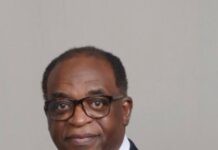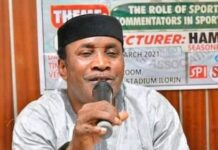 Thirty five years ago this month the New Nigerian ran a series of interviews I conducted on its behalf with some of the most prominent members-elect/nominee of the 1978 Constituent Assembly – 14 in all, spread all over the country. The idea was to give the public some insight into the collective mind of the putative CA, the better to influence its final outcome for the common good.
Thirty five years ago this month the New Nigerian ran a series of interviews I conducted on its behalf with some of the most prominent members-elect/nominee of the 1978 Constituent Assembly – 14 in all, spread all over the country. The idea was to give the public some insight into the collective mind of the putative CA, the better to influence its final outcome for the common good.
The subjects covered were wide ranging but arguably the most important of them all, and certainly the most controversial, bar possibly Sharia, was revenue allocation. Of the 14 I interviewed – Dr. Sola Saraki, Chief Soji Odunjo, Alhaji Yahaya Gusau, Chief C. C. Onoh, Malam Usman Abubakar, Chief Richard Akinjide, Mr George Hoomkwap, Dr Suleimanu Kumo, Chief Nwobidike Nwanodi, Malam Adamu Ciroma, Chief Stanhope Alozie Ubani-Ukoma, Malam Aminu Kano, Professor Omo Omoruyi and Alhaji Shehu Shagari – all but two, Nwanodi and Omoruyi, expressed strong views on the subject.
The two declined to speak on the subject but only Omoruyi said why; he was, he said, a member of the Aboyade technical committee the military authorities had set up to suggest a revenue allocation formulae to the CA. Another two, Akinjide and Ubani-Ukoma, did not speak on the subject because inadvertently I did not put the question to them.
The Aboyade panel, the seventh in a list of eight fiscal review commissions between 1946 and November 1979, was headed by the late Professor O. Aboyade, then Vice-Chancellor of Ife University, now Awolowo. The eighth panel, set up by Alhaji Shehu Shagari in his first month as the first elected president of the country, was chaired by the late Dr. Pius Okigbo. Both Aboyade and Okigbo were renowned economists.
The Aboyade panel seem to have established the allocation template that has been used since. His formula gave the central government 60% of the federation account, 30% to the states and 10% to local governments; the first time the so-called third tier of government was to enjoy autonomous revenue.
Aboyade also recommended that 3% of the Federal Government’s share should be set aside for mineral producing areas and for emergencies.
The Okigbo panel merely tinkered with this formula; it reduced the FG allocation to 53% but then recommended that the 7% hived off into a Special Fund for the Federal Capital Territory (2.5%), Mineral producing areas (2%), Ecology (1%) and Revenue Equalization Fund (1.5%) should be administered by the FG.
Needless to say, the oil producing areas of the country found this formula unsatisfactory in so far as it looked like a highly retrogressive step from the Raisman Commission of 1958 which had recommended that 50% of mining rents and royalties be based on derivation, a recommendation that became the subsisting revenue allocation formula until the soldiers truncated the First Republic in January 1966.
Of all my ten interviewees who spoke forcefully on the subject, two stood out clearly as a study in contrast of sorts; Onoh and Hoomkwap, both now late. Onoh’s interview which was published on August 22, 1977, provided, I think, the deepest insight into the history of revenue allocation in the country. “The history of revenue allocation,” he said, “is dirty…It seems to me revenue allocation is based on who is in power rather than according to any just principles.” At any rate, said the old man, states ought to get more of the federal revenues than the centre, with greater emphasis on derivation than had been the case.
In sharp contrast Hoomkwap was totally against derivation – in principle. It may be given 10% for a while, he said, but in the long run it should be scrapped.”Oil,” he said, “belongs to all of us and not just to the areas from where they are produced. When we had a war on our hands which was partly triggered by the question of oil, it was not the oil producing areas that fought it, but all of Nigeria. And surely blood is thicker than oil.”
By the time the 1999 Constitution came into being a little over thirteen years ago it was obvious that the Hoomkwap point of view had lost out; for the first time in the long history of the review of our constitutions since our colonial days, a clause -162(2) – was added making it mandatory to allocate a minimum of 13% of federal revenue to derivation.
Anyone who thought this development was enough to satisfy the oil producing areas had another think coming. Far from accepting it as satisfactory, the concession seemed to have only fuelled their demand for more. Which, come to think of it, was not exactly surprising, considering the weight that had been attached to derivation throughout the First Republic.
The problem, as some leading Nigerians who can hardly be accused of hostility towards the oil producing areas have argued, was that comparing oil to, say, cocoa, palm oil and groundnut, was like comparing apples to oranges. One such Nigerian was the late pre-eminent economist, Professor Sam Aluko.
Aluko was consistently of the view that 13% derivation for oil was too small. “We discussed it when I was in government (of General Sani Abacha)… I said 20 to 25% could be enough because the money we make there we don’t spend there,” he said in an interview in The News (October 9, 2000).
Even then, he said, it was wrong for the oil producing areas to keep comparing oil with agricultural produce. “I don’t think the people of the oil producing areas,” he said in the interview in question, “appreciate it that they have no input in the exploitation of oil. They just sit down and want this money…Unlike cocoa the whole country’s money is used to exploit petroleum. It is not the money of the indigenes of the oil producing areas. It is just like manna from heaven.”
Aluko also often questioned, quite rightly in my view, the concept of federalism canvassed by the oil producing areas. This is simply because Nigeria’s is a peculiar one in which, instead of a true federation like America or Canada in which the hitherto independent constituents came together to cede certain powers to the centre, it was the centre that created the units. “What,” he asked still in the interview in question, “is true federalism? Who created Bayelsa, Akwa-Ibom and others? Can you be greater than your creator?”
It therefore came as no surprise to him, he said in an interview in The Country (May 20-26, 2002), since rested, when the oil producing states lost their case at the Supreme Court in April 2002 for the abrogation of the onshore/offshore dichotomy in the application of 13% to the principle of derivation, an abrogation President Olusegun Obasanjo had apparently prayed against before the court through his Attorney-General and Minister of Justice, the late Chief Bola Ige when he asked the court to determine the seaward boundaries of the littoral states of Akwa-Ibom, Bayelsa, Cross-River, Delta, Lagos, Ogun, Ondo and Rivers. All but Lagos and Ogun are oil producing.
The full court of seven justices with then Chief Justice of Nigeria, Justice Muhammadu Uwais, presiding, delivered a unanimous verdict in favour of the Federal Government by limiting the seaward boundaries of the littoral states to 24 nautical miles (45 kilometres) instead of the 200 nautical miles canvassed by the oil producing littoral states.
Predictably, all hell broke loose thereafter, as leaders and organizations from the oil producing areas threatened fire and brimstone if the judgement was allowed to stand. Professor Itse Sagay, a constitutional lawyer from the region, for example, dismissed the judgement as “somewhat specious and disingenuous,” in an article in the Sunday Vanguard of April 21, 2002.
In a subsequent advert in the Vanguard of April 29, the Ijaw National Congress said it rejected the verdict and regarded it as “a declaration of war against the defenceless people of Niger Delta.”
In a similar but even more bellicose advert in the Saturday Punch of April 20, 2002, the Niger Delta Youth Congress virtually threatened to go to war over the verdict. “The ruling,” it said, “posits that the only way for the people of the Niger Delta to regain their territorial integrity and enjoy the benefits of their God-given natural resources is to renegotiate their membership or otherwise form a Nigerian federation which has its laws and Constitution skewed in favour of an unnecessarily large, powerful and domineering Central government.”
What Professor Aluko had to say about all this furore as an economist and a public affairs analyst with deep sympathy for the people of the oil producing Delta region is highly significant for a possible resolution of the resource control debate that seems to have been reignited by Daily Trust’s recent exclusive interview with Dr. Rabiu Kwankwaso, the governor of Kano State, in which he called for a revisit to the law which abrogated the onshore/offshore dichotomy in the wake of the tension the Supreme Court judgement that upheld it created.
The professor’s remark will form the basis of the continuation of this piece next week, God willing.



